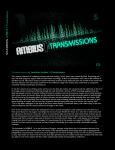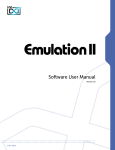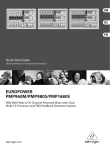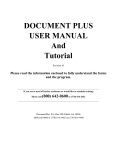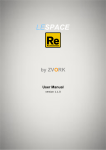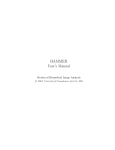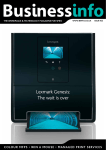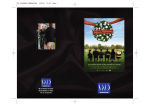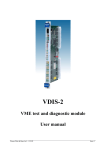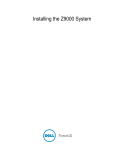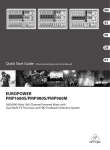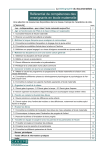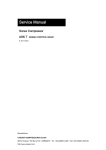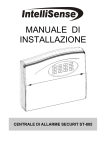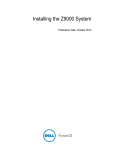Download PDF User Manual
Transcript
SOUNDIRON AMBIUS 2: SYSTEMATIK We welcome you to the Soundiron Ambius 2: Systematik. This library is an exploration of organic synthesis, an open-ended library that puts the power of sound design in the hands of the user. It represents a huge new step forward in our quest to build a truly flexible and adaptive sample based atmospheric synth. We wanted a broad collection of richly nuanced flavors with the ability to freely layer, blend and reshape a wide mix of percussive, tonal and textural elements into custom multi-layered dynamic and evolving instruments. We wanted a unified and powerful interface to combine detailed performance and tone shaping controls with a wide pallet of experimental and environmental convolution effects. We wanted a built-in tempo-locking stepsequenced filter and LFO engine that could be adapted to just about any other GUI control parameter on the fly without missing a beat. Ambius 2 is all of that and far more. The UI is incredible, thanks to some brilliant artwork by Dickie Chapin and Chris Marshall's genius systems designs and each sound has been individually custom-designed by the Soundiron crew. One of the driving forces behind the development of our second atmospheric synth collection was the desire for a fresh sound based on real organic recordings that was both super flexible for those of us who like to knob tweak and yet still easy to dive into for those who want it to sound great right out of the box with minimal fuss. It allows you to blur the line between lead and ambient textures and just as easily morph between tight, tuned percussive and smooth, dreamy pads. We've created a deep pool of elements to choose from and shape, with a wide palette of sonic flavors ranging from fat lo-fi leads to crisp, complex hi-fi soundscapes. All of the sounds we created for Ambius 2 were sourced from live acoustic instruments and hand-sculpted individually into unique and fully customizable playable concepts. The foundation of Ambius 2 is in the layer building concept, which allows you to combine a range of tuned percussive attack samples with a broad variety of richly detailed sustaining pads and leads. Each layer is equipped with independent core parameter control and can be swapped out on the fly through the GUI or with CC/host automation so your instrument can evolve with the music. We then take it a step farther with the Instrument Designer concept, with 6 independent hand-picked layers that absolutely blow the creative possibility wide open. Each layer can be freely blended and warped with different tonal, shape and dynamic behaviors that allow your sound to radically transform itself based totally on the way you play. The next step was to turn the entire beast into a rhythmic monster. We engineered an entirely new way to provided tempo-locked filtering and LFO based parameter automation. We started with a pair of 32-beat step-sequencer graphs that let you freely draw resonance and cutoff values from one step to the next, with time divisions from whole notes to 128ths. You can choose from Lowpass, Highpass, Bandpass and Vowel filter types. 1 SOUNDIRON AMBIUS 2: SYSTEMATIK We've also smoothed parameter changes to prevent ugly zippering, but with the ability to dial in ultra-tiny timesignature divisions and extreme filter settings, you can get as gnarly and screeching or warm and mellow as your heart desires.You can also assign just about any parameter to each step sequencer table with the simple right-click/cmd-click learn function whenever that table is running.You can even skip the filter stage and simply use it for tempo-synced CC parameter control by choosing the “Thru” filter type or bypass the whole system instantly with the LFO Pause and do your filter tweaking and sweeping by hand. There's also a free/syncable amplitude oscillator, full EQ tone controls, our custom convolution reverb loaded with dozens of spaces and special FX and of course, our ever advancing Uberpeggiator meta-arpegiation system. The duallayer sustaining ambient presets also feature simulated polyphonic legato with polyphony, bend, speed and range control. You'll find cutting edge Kontakt 5 presets that allow step sequencer and uberpeggiator table graph preset saving/loading and the latest filter options, classic Kontakt 4-friendly presets with classic filter types and resource efficient lite presets that save ram and CPU resources without the filter LFOs or a deep offset range. They're perfect for on-the-go laptop composing or when you just need the basics, without sacrificing sonic quality or control options. More about the presets and features... The primary "Instrument Designer" .nki presets feature a proprietary system that allows the user to select from a wide range of specially modified tuned acoustic transients and combine them with hand-designed sustaining tonal elements. The Transient and Sustain phases can each be independently replaced, reshaped and re-tuned in real-time and feature their own separate parameter controls. They can be layered together as a single unified sound, or the user can smoothly cross-fade between them with the Blend slider. Nearly every parameter in these instrument, including transient and sustain layer sound selection, can be fully automated using your host’s automation routing, standard CC assignments or routed directly through the integrated LFO step sequencer tables. The Transients .nki presets allow combinations of 2 separate selectable tuned percussive elements and the Sustains .nki presets allow custom dual-layer ambience design. These presets are essentially auxiliary to the Instrument designer presets, but they allow you direct access to just the specific elements in the library they need and focus in on them to create different sonic combinations. The Transients have a sharper, more aggressive attack and normal decay, while the Sustains are more atmospheric and infinitely looping. The special "Layer Builder" presets combine 4 different transient elements and 2 sustaining elements, each with individual controls to allow the creation of unique complex and evolving acoustic-synthetic hybrids. These are more resource intensive, but can create unique and complex musical sounds that the user can easily sculpt to create their own original sound concepts in any number of ways. In all of these presets, you can choose from a wide array of different sounds and then completely reshape them with the interface to create a limitless musical variety. Every instrument preset also features a range of powerful integrated tools. First, we have the heavily upgraded LFO panel. This section includes the Filter and Tremolo controls. The Tremolo section of the LFO panel contains a standard volume LFO, for tempo-synching or Hz-based tremolo effects. You can select waveform type, time signature/rate and intensity. However, this is where things really go way beyond anything we've done before. In the filter section of the LFO panel, you can select from 4 different filter types and manually control/automate cut-off and resonance.You can also assign cuttoff and resonance to our unique step-filter system, the Kronostepper. This step-sequenced tempo-synching LFO engine allows complex tempo-based midi parameter oscillation with two fully independent sequencer tables. The tables default to cutoff and resonance for the filters. However, they can also be used to drive tempo-locked step sequenced automation for any other knob or slider in the instrument preset. If you want to use the Kronostepper to control instrument parameters without the filters enabled, you can select the "-Thru-" filter mode to pass through the automation to drive any Kontakt parameter at all. If you want to kill the automation or assign a control to a midi CC without locking it to the table table LFO system, simply press the LFO Pause button in the top right corner to bypass the sequencer loop. We've also integrated our Uberpeggiator system for adaptive step-sequenced arpeggiation, with full control over scale, key, rhythm, velocity and a variety of custom parameters, as well as a time-scalable velocity table. In the Kontakt 5 (“K5”) presets, you can also import and export your own custom table sequences for both the Uberpeggiator and the LFO filter step sequencer table system as .nka files and these custom presets can even be shared between the two systems. The .nka table preset files are stored in this library’s Data folder. See Pages 6 - 12 for more detailed information and tips on using these powerful tools. 2 SOUNDIRON AMBIUS 2: SYSTEMATIK SOUNDIRON AMBIUS 2: SYSTEMATIK version 1.0 OVERVIEW 65 open-format Kontakt 4 instruments / 41 open-format Kontakt 5 instruments 1,672 Samples 4.9 GB Installed 24bit / 48kHz stereo PCM wav samples (non-encrypted) Powerful custom performance and FX control interface 51 custom convolution reverb impulses integrated into the GUI Reverb tab Note: • The full version of Kontakt 4.2.4 (for K4 presets) and Kontakt 5.0.3 or later is required. • The free Kontakt “Player” does not support this library. CREDITS Production, Recording and Preset Design by Mike Peaslee, Gregg Stephens, Chris Marshall Programming, Scripting & Systems Design by Chris Marshall Sound Design by Mike Peaslee, Gregg Stephens, Chris Marshall & Brad Halverson UI Design, Artwork & Photography by Constructive Stumblings, Gregg Stephens, Chris Marshall and Mike Peaslee Editing by Mike Peaslee, Gregg Stephens & Brad Halverson Beta Team: Brad Halverson, Blake Ewing, Dirk Ehlert, Max Zhdanov, Paul Amos, Reuben Cornell, Russell Bell, Sascha Knorr, Shannon Penner and Simon Russell TABLE OF CONTENTS General :: INTRODUCTION - Pages 1 - 2 OVERVIEW & CREDITS - Page 3 Technical :: FIDELITY, ACOUSTICS, FORMAT & CONVOLUTION - page 4 SYSTEM REQUIREMENTS, DOWNLOAD & INSTALLATION - Page 5 User Interface :: MAIN FRONT PANEL CONTROLS - Page 6 EQ CONTROLS - Page 7 UBERPEGGIATOR CONTROLS - Page 8 CONVOLUTION REVERB CONTROLS - Page 9 LFO FILTER & TREMOLO CONTROLS - Page 10 LEGATO CONTROLS - Page 11 LAYER BUILDER CONTROLS - Page 12 Instrument Descriptions :: INSTRUMENT PRESETS - Pages 13-16 Info :: LICENSE AGREEMENT - Page 17 THANK YOU - Page 18 3 www.soundiron.com SOUNDIRON AMBIUS 2: SYSTEMATIK ABOUT THIS LIBRARY Fidelity Custom Convolution Impulses This library was recorded in wide stereo at 48kHz / 24bit, with some content recorded on location in a variety of live and synthesized environments, so you’ll hear environmental coloration and tone. We feel these subtle natural imperfections add life and character to the sound. Therefore, please keep in mind that this library isn’t designed to provide perfectly sterile samples. We enjoy capturing the unique acoustic characteristics of spaces and locations that we come across from time to time. Sampling environments is similar to sampling instruments in many ways. It’s done with portable loudspeakers to produce a special sine wave sweep that covers a wide spectrum, from 22 Hz to 22 kHz. We then use dedicated deconvolution software to decode the resulting audio into an impulse response file, which is a wav file with special phase, frequency and timing information embedded in the audio. Format Accessibility All of the sample content and impulse files are included as standard non-encrypted PCM wav files and standard openformat Kontakt presets to allow you easy access to manipulate, reprogram and customize the sounds however you prefer. We know that it’s important for many users to be able to go beyond the limitations of any one sampler or preset structure, so we’ve kept this library’s directories and files open for advanced users. As a professional, you may have your own workflow or format requirements, and we trust that you'll respect our hard work and won't share this content with anyone who hasn't paid for it. Keep in mind that to use and/or edit the Kontakt presets, you’ll need the full retail version of Native Instruments Kontakt 4.2.4 (K4) or Kontakt 5.0.3 (K5) or later. Please be aware that the free Kontakt “Player” and any other version or form of Kontakt that came bundled with any other library or software product (other than NI’s “Komplete” package) will not support this library. The free Kontakt Player is NOT a full version of Kontakt and cannot load or play standard open-format Kontakt instruments or libraries. Please read all instrument specs and software requirements before purchasing this or any other Soundiron products to see the full list of software requirements, features and format compatibility for each library. Most impulses sound like an odd sort of sharp snap, like a balloon pop or starting pistol fired in the environment that was captured – which is is in fact how impulses used to be made. When loaded into a compatible convolution reverb effect (such as the one built into Kontakt), these impulses impart their sonic properties fairly well into most sounds. Of course, it's an imperfect science and much is lost in the translation, especially if the sound being played through it also has it's own strong tonal, phase or reflective properties. Sometimes the results are incredibly lifelike and just as often, they can be completely surreal. It all depends on the sound, the impulse, the settings you choose. We've included a hand-selected collection of impulse files that we think compliment this library’s sound directly built into the GUI. You can load them into most instrument presets by using the Reverb control panel tab and selecting an impulse from the Impulse drop-down menu. You can also manually import any of your own wavs into the Convolution effect within Kontakt’s instrument editor view, down in the Insert Effects module. Just make sure to set the Reverb control to On and Custom to enable convolution impulse wav import and custom preset saving. Be aware that convolution processing can often create powerful and piercing resonances when applied to many audio sources – especially loud sounds that contain strong mid to low frequency harmonic components. While you can reprogram the samples or presets to other formats, we always recommend using Kontakt for best results, since it widely considered the industry standard and easily the most powerful sample programming and playback platform on the market. However, if you wish to convert or reprogram the wav files and instrument presets into any other sampler or softsynth format, be aware that not all settings and properties will translate accurately, reliably or even at all from one instrument or audio format to the next, due to vast differences in standards, behaviors, structures and capabilities that each platform relies on. 4 SOUNDIRON AMBIUS 2: SYSTEMATIK System Requirements Please be aware that many instrument and multiinstrument programs in this library are extremely ram/ cpu and hard disk-streaming resource intensive. We highly recommend that you have a 64-bit operating system (Windows or OSX) with at least 4GB of system ram, a quad-core cpu and a 7200 rpm SATA hard disk or better before purchasing this particular Soundiron library. Large sample sets like those found in this library may load slowly and may cause system instability on older machines. We provide the Continuata Connect download manager to offer high-speed, reliable and fully automated library downloading and installation. Download and run the latest version for your OS (PC or Mac) before proceeding. You may also need to add special permissions to your security software for the downloader, if it blocks applications from accessing the web. Don't move, rename, delete or modify any of the files or folders created during the download until after you see the status message for all files in your download queue display the word "INSTALLED". Please don't close the downloader while it's actively downloading, unless you press the pause button first. To resume downloading, press the Resume button. If you need to resume If the downloader reports a DL Error or Install error, it will automatically try to download the file again until it successfully downloads and verifies all the data it needs. It’s best to allow it to finish the process before trying to move or access the library data. Please see your download email for more detailed instructions. Manual Download Download & Installation Next, copy-paste your download code from your download email into the Code box in the downloader window. Make sure to leave out any spaces before or after the code. Press the download button and select the location you'd like to download and install the library. It will automatically start downloading the file(s) and then error-check, extract and install the finished library. Once installation is fully complete, you can remove the .rar download files and store them in a safe place as a back-up copy. We always recommend downloading the latest version of our downloader before you begin. The link in your email will always take you to the latest version. 5 downloading after closing the downloader, run it again and enter your code and press Download again. Then select the same download/installation location on your computer that you chose originally. If you have any trouble with our Downloader utility or prefer to use your browser or another download manager, log into your personal manual download page on our website, by using the direct link in your download email. Log in using your download code. Or, if you used the downloader originally, but you need to re-install the library manually for any reason at a later time you can always re-use the original rar files. To do that, you'll need Winrar, UnrarX or another full-featured Rar extraction utility to extract and install the library. Please note that Stuffit Expander and Winzip DON’T support many types of common rar files. Preset Loading Once installation is complete, you can browse and load the included .nki presets using the Files or Database tabs in the Kontakt Browser, or through the main File load/ save menu. Please allow presets to finish loading completely before loading a new one. You can’t use the Libraries view to load standard open-format Kontakt Instruments like this library. Only locked “Powered-ByKontakt” Libraries are visible to that propriety browser view. The “Add-Library” function does not support this product or any other open-format Kontakt library. This library doesn’t require any special activation. SOUNDIRON AMBIUS 2: SYSTEMATIK Main Front Panel Controls This instrument has a variety of special front panel performance controls that allow real-time customization. Not all instrument presets include all controls listed below, depending on the specific features suitable for each preset. Some may also use alternate CC mappings.You can see each control’s assignment by clicking on each UI control to display the “hint” text in the Info bar at the bottom of Kontakt. Each layer in Ambius 2 presets have individual controls for basic sound-shaping and performance adjustments. Each is also bound to a different midi CC to allow for easy automation. Swell - (CC 72 & 73) This knob controls the volume swell of the respective layer. Attack - (CC 74 & 75) This knob controls the sharpness of attack. Increasing the value causes the sound to attack more softly. Offset - (CC78 & 79) This controls the amount of sample start offset allowing you to jump ahead into samples to change the sound. Release - (CC76 & 77) This controls the release time of the main note samples. Lower settings cause the sound to be damped and cut off, while higher settings allow notes to blend together. Stepping This knob controls the pitch of each layer in semitones with a range of +- 36 semitones.. Blend Button When active, allows smooth crossfade blending between the two layers. Blend Slider When “Blend” is active, this slider controls the crossfade between the two layers. Transient/Layer 1 Dropdown Use this dropdown to select the articulation for the Transient or Layer 1 (depending on preset). Users can automate this dropdown by assigning an automation to the label above the dropdown. Sustain/Layer 2 Dropdown Use this dropdown to select the articulation for the Sustain or Layer 2 (depending on preset). Users can automate this dropdown by assigning an automation to the label above the dropdown. LFO Pause Button This bypasses the LFO system. Use this to temporarily suspend an active step sequencer cycle if you wish to assign CCs to any UI control without having it also auto-mapped to the step sequencer tables. This button only has an effect while the LFO, filter or tremolo systems are currently in the On mode. Tab Area Button Bar Controls EQ, Uberpeggiator, LFO, Reverb and Legato. These buttons change which controls are displayed on the lower right panel of the UI, allowing one to control the various parameters of each effect. See more detailed descriptions of these controls later in this document. Note: The Uberpeggiator tab is replaced by the Legato tab in all Sustain presets. 6 SOUNDIRON AMBIUS 2: SYSTEMATIK EQ Controls The EQ tab contains a full three-band equalizer. This special panel can be found in all of the instrument presets. EQ3 On/Off This button enables/disables the 3-band Parametric EQ. Bass Gain This knob sets the amount of gain for the bass frequency band. Mid BW This knob sets the bandwidth for the Mid band. Treble Freq. This knob sets the frequency for the treble band. Treble Gain This knob sets the amount of gain for the treble frequency band. Bass Freq. This knob sets the frequency for the bass band. Treble BW This knob sets the bandwidth for the treble band. Mid Freq. This knob sets the frequency for the mid band. Bass BW This knob sets the bandwidth for the bass band. 7 Mid Gain This knob sets the amount of gain for the mid frequency band. SOUNDIRON AMBIUS 2: SYSTEMATIK Uberpeggiator Controls Ambius 2: Systematik features a flexible, custom arpeggiator system to expand the instant creative potential of some of the presets. It includes automatable performance controls that shape all aspects of the arpeggiator. When used normally, pressing a key causes the note to self-repeat as long as a key is held down. If additional notes are played, it adds them to the sequence of repeats in various ways, depending on the settings you choose and can be used to produce complex melodic chains, plucking patterns and other effects. Mode This knob controls the Arpeggiator mode. Choosing Off disables the Arp system entirely. • On sets it to respond only while a note is pressed., cycling through all held notes as it arpeggiates. • Hold sets it to automatically sustain one note at a time, (monophonic) so that changing keys changes the note that is repeating. • Hold +- sets it to allow new notes to be added to the automated chain of repeats. • EZ-Roll sets it to allow polyphonic rolls to be played. Random This knob humanizes the velocity and timing of each Uberpeggiator step. Note Order Menu This drop-down menu allows you to select any number of simple or complex cycle patterns that the arpeggiation will follow as it plays through the sequence of notes you have triggered. Choosing “As Played” will cause it to follow the original order you played the notes in, with the newest note always added to the end of the chain. Velocity Graph Sequencer This graph allows you to draw the velocities that you want each step in your arpeggiation sequence to play at. Reset This button resets all steps in the graph to a default value of 0 (blank). Steps This setting determines the number of sequencer steps (2 - 32) that can be set with the velocity graph step sequencer. Duration This knob allows the user to fine-tune the length of each note. Using this, one can shorten the note to staccato-like pulses or extend them beyond the normal beat length. Repeat Setting This sets the direction of the up or down repeats. Rhythm This sets the speed of arpeggiation, as measured in musical time, ranging from whole bars to 128th notes. Fast settings can yield interesting results, but keep in mind that the faster the speed, the more voices you use. Free/Constrain Button Limits and adjusts any new note to the currently selected scale and key. Swing This sets the amount of rhythmic offset (swing) between notes.Values below zero cause the notes to play ahead of the beat.Values above zero cause the notes to play after the beat. Hits and Hit % Knobs Sets the number of repeats of each note BEFORE moving on to the next note in the arp sequence, and Hit % sets the intensity fall-off rate for each repeat, before resetting for the next note. 8 Scale Selector Control binds the arpeggiation sequence to a specific scale that you can choose by turning the knob. As Played / Table This activates the Graph. When active, the arpeggiation follows the velocities that you’ve drawn on the graph from left to right. When it is bypassed, each note is played at the velocity that it was originally played at. Key Selector Knob Binds the arpeggiation scale you’ve chosen to a specific key. Save / Load These buttons (available only in K5 Presets) allows users to save and load Uberpeggiator table patterns. SOUNDIRON AMBIUS 2: SYSTEMATIK Convolution Reverb Controls We’ve incorporated our custom convolution impulses into each instrument preset, with full control over all available convolution effect parameters. Convolution On/Off This button enables/disables the convolution reverb effect. High Pass Sets the high frequency cut-off of the impulse response, allowing you to remove rumble and low end. Custom On/Off Turning this button “On” allows for custom impulse loading. It bypasses the ability to load any of our provided impulses so users can save custom presets with custom impulses. Delay Sets the amount of pre-delay time before the wet signal is returned Dry Sets the amount of dry gain (+/-) that is passed through the effect. Wet Sets the amount of wet gain (+/-) that is passed through the effect. Size Sets the simulated room size of the convolution. Low Pass Sets the low frequency cut-off of the impulse response, allowing you to dull and darken the sound. 9 Impulse menus These menus allow you to select from a wide variety of custom convolution reverb impulses that we've personally captured or created for you, separated into experimental FX impulses and simulated real-world spaces. Effects This menu allows you to select one of our special effect convolutions. Selecting an impulse from this menu overrides and unloads any currently loaded impulse from the Spaces menu. Spaces This menu allows you to select one of our real-world environmental convolutions. Selecting an impulse from this menu overrides and unloads any currently loaded impulse from the Effects menu. SOUNDIRON AMBIUS 2: SYSTEMATIK LFO Controls Ambius 2 features a brand-new, flexible LFO system that allows users to design their own waveforms and select from a variety of different filters. FILTER Rhythm This knob controls how much time in standard rhythmic divisions each step in the table will represent. For example: Quarter notes, eighth notes, 64th notes, etc... Filter On/Off This button enables/disables the filter effect. Cutoff (CC92) Controls the frequency cutoff for the filter effect. Steps Sets the number of total of steps in the current sequence loop for the currently displayed table. Resonance (CC93) Controls the resonance for the filter effect. Retrigger Button This button toggles whether the table sequence should re-trigger on each new note event or proceed at a fixed continuous cycle. For example: leaving this mode on is great for filter echo effects, while turning it off is better for stutter effects. C.Table On/Off This enables/disables the table step sequencer. When switched Off, the filter cutoff settings are controlled by the Cutoff knob. When On, the cutoff frequency locks to the tempo-synced step sequencer table. R.Table On/Off This enables/disables the table step sequencer. When switched Off, the filter Resonance settings are controlled by the Resonance knob. When On, the filter Resonance locks to the tempo-synced step sequencer table. TREMOLO Filter Select Dropdown Use this dropdown to select the type of filter. The list of available filters differs between the Kontakt 4 and Kontakt 5 versions. Each preset features a “-Thru-” mode which allows users to bypass the filters, while still being able to sequence any automatable control in the instrument to the step sequencer tables. Save /Load These buttons (only available in Kontakt 5 presets) allow the user to save and load table sequences into the table window currently displayed. Custom presets are stored in the Data folder as .nka preset files. Cutoff / Resonance Buttons These buttons choose which table is currently displayed for editing, switching between cutoff frequency or resonance. 10 Intensity (CC90) This knob controls the intensity of the Tremolo effect. Turning the knob all the way to the left turns the effect “Off.” Rate This knob controls the rate of the tremolo effect. This is either in Hz or musical divisions depending on the Free/ Sync setting. Free/Sync Buttons These buttons toggle whether the “Rate” of the tremolo effect should be in Hz or tempo-synced musical divisions. Waveform Dropdown Use the dropdown to select the type of waveform of the tremolo effect. SOUNDIRON AMBIUS 2: SYSTEMATIK Legato Controls Sustains presets contain most of the standard sound-shaping controls as normal presets, but also offer some different functionality. In place of the Uberpeggiator, these patches contain a Legato tab. Speed In Sustains presets, the Speed knob controls the speed of the pseudo-legato pitch bend when it is enabled. When turned all the way down, the bend is slow; turned all the way up, the bend is fast. XFade This knob controls the amount of crossfade between samples during legato transitions. Polyphony This knob controls the available number of separate legato positions. Using this allows for up to three separate legato melodies to be played simultaneously. Bend On/Off This button toggles on/off simulated pitch bending during legato transitions. Legato On/Off This button toggles legato mode on/off. Range This knob controls the interval range within which a legato transition will occur. When used with Polyphony, any legato transition played greater than this setting will trigger another legato position. 11 SOUNDIRON Rust 3 Layer Builder Controls The Layer Builder presets are special presets that combine 6 different articulations together allowing you to sculpt original tuned percussive and sustaining instrument hybrids. Layer Selection Button Click on one of the layer selection buttons to activate the controls for the selected layer. Note that the Volume, Attack, Offset, Release, Stepping and Curve are individually editable per layer. The Swell is global for the entire preset. Offset (CC100-105) This knob controls the offset of the currently selected layer. This allows you to skip past the transient and farther into the note, to create unique soft notes, or to isolate only the resonant decay. Volume Slider Each layer has an individual volume slider that controls the volume for only that layer. Release (CC94-99) This knob controls the release of the currently selected layer. Reducing this value makes the layer more staccato-like. Solo Button Each layer has a solo button that mutes all other layers and only plays that layer. Stepping This knob controls the Stepping (pitch) for the currently selected layer and can be adjusted +/- 24 semitones. This control is useful for creating interesting octave and harmonic layers when combined with other layers at different Stepping values. Mute Button Each layer has a mute button that mutes that layer, allowing for more customization. Swell (Global) - (CC72) This knob controls the volume swell of all layers. Attack (CC106-111) This knob controls the attack of the currently selected layer. Use this control to make a layer behave essentially as a pad. 12 Vel. Curve These buttons control an added layer of dynamics to the currently selected layer. The first mode, Normal mode, adds enhanced dynamics, further lowering the volume of soft notes, relative to the volume of hard notes, effectively making it a loud dynamic layer. The second mode, Invert mode flips the dynamic response upside down, reducing the volume as the velocity increase, effectively making it a soft dynamic layer. Finally, in Off mode, the layer’s velocity behavior is unchanged. SOUNDIRON AMBIUS 2: SYSTEMATIK INSTRUMENT PROGRAMS The instrument presets are separated into 5 main categories: Customized, Instrument Designers, Layer Builders, Sustains and Transients. These categories are further subdivided into 3 types of each preset: K4, K5 and Lite. We designed this library for Kontakt 5 specifically, so many features require Kontakt 5.0.3 or higher. The K4 presets will work in Kontakt 4.2.4 or higher, but they lack saving and loading for table presets and have a slightly different selection of available filters. Note: Lite patches are K4-compatible and designed for lighter systems with less RAM and lower CPU power. They do not include the LFO step sequencer system and rely more heavily on disk streaming to conserve ram. The Customized presets do not include “Lite” versions because of the lack of sequenced LFO support that would be needed to include them. CUSTOMIZED Customized presets are examples of the variety of sounds that are possible with the features of Ambius 2. Each of us at Soundiron customized a selection of presets with reverb, uberpeggiator and our new sequenced filter LFOs. Ambius 2 Bezildincer.nki Custom undulating preset based of off our A-D Instrument Designer. This preset is mapped from C-2 – G8. Ambius 2 Bounzer.nki Custom arpeggiating preset with a slow filter sweep based of off our X-Z Transients. This preset is mapped from C-2 – G8. Ambius 2 Buzzlexic.nki Custom fuzzy preset with a vowel filter sweep based of off our ES Instrument Designer. This preset is mapped from C-2 – G8. Ambius 2 Darklyte.nki Custom dark, echoey preset based of off our E-S Instrument Designer. This preset is mapped from C-2 – G8. Ambius 2 Drance.nki Custom arpeggiated preset based of off our T-W Instrument Designer. This preset is mapped from C-2 – G8. Ambius 2 Ludovico.nki Custom synthetic preset based of off our T-W Instrument Designer. This preset is mapped from C-2 – G8. Ambius 2 Metrozine.nki Custom sharp, droning preset based of off our T-W Instrument Designer. This preset is mapped from C-2 – G8. Ambius 2 Mystek.nki Custom gloomy, echo-delayed preset with sequenced blending based of off our X-Z Sustains This preset is mapped from C-2 – G8. Ambius 2 Oxident.nki Custom preset with floating, magical sound based of off our X-Z Instrument Designer. This preset is mapped from C-2 – G8. Ambius 2 Pulstar.nki Custom preset with slight fuzziness and extra slow sweeping filter based of off our A-P Instrument Designer Smooth preset. This preset is mapped from C-2 – G8. 13 SOUNDIRON AMBIUS 2: SYSTEMATIK CUSTOMIZED continued... Ambius 2 Storblight.nki Custom “talking” preset from outer space based of off our A-D Instrument Designer preset. This preset is mapped from C-2 – G8. Ambius 2 Stutterfunk.nki Custom preset with sharp filter changes based of off our A-D Sustains preset. This preset is mapped from C-2 – G8. Ambius 2 Thistler.nki Custom synthetic whistling preset with a wavy filter sweep based of off our A-S Instrument Designer Pulse preset. This preset is mapped from C-2 – G8. Ambius 2 Trouncer.nki Custom alarm-like preset demonstrating sequenced controls based of off our X-Z Instrument Designer. This preset is mapped from C-2 – G8. Ambius 2 Xyode.nki Custom arpeggiated preset with a sonar-like effect based of off our X-Z Instrument Designer. This preset is mapped from C-2 – G8. Ambius 2 Zztalker.nki Custom horror preset based of off our T-W Instrument Designer. This preset is mapped from C-2 – G8. INSTRUMENT DESIGNER Instrument Designer presets are dual-layer presets separated into Transients (impacts) and Sustains. These patches allow you to mix-andmatch a large selection of transients with any of a large number of sustains. Each layer has individual performance controls to allow for unprecedented customization with over 1500 possible combinations. Ambius 2 Instrument Designer Dual A-D.nki Preset containing selectable transients and sustains with names AD. This preset is mapped from C-2 – G8. Ambius 2 Instrument Designer Dual E-S.nki Preset containing selectable transients and sustains with names ES This preset is mapped from C-2 – G8. Ambius 2 Instrument Designer Dual T-W.nki Preset containing selectable transients and sustains with names TW. This preset is mapped from C-2 – G8. Ambius 2 Instrument Designer Dual X-Z.nki Preset containing selectable transients and sustains with names XZ. This preset is mapped from C-2 – G8. Ambius 2 Instrument Designer Pulse A-S.nki Preset containing all pulsing, rhythmic transients and sustains with names A-S. This preset is mapped from C-2 – G8. Ambius 2 Instrument Designer Pulse T-Z.nki Preset containing all pulsing, rhythmic transients and sustains with names T-Z. This preset is mapped from C-2 – G8. 14 Ambius 2 Instrument Designer Smooth A-P.nki Preset containing all smooth arhythmic transients and sustains with names A-P. This preset is mapped from C-2 – G8. SOUNDIRON AMBIUS 2: SYSTEMATIK Ambius 2 Instrument Designer Smooth O-Z.nki Preset containing all smooth arhythmic transients and sustains with names O-Z. This preset is mapped from C-2 – G8. LAYER BUILDERS Layer Builders are special presets that feature 6 individual layers -- 4 transient and 2 sustain -- each fully customizable. Users can control the tuning, attack, release offset and even velocity curve of each layer. Ambius 2 Layer Builder Ambotical.nki Layer Builder with Abuka, Mebino, Ponos, Timpora, Clickwerk and Yailing. This preset is mapped from C-2 – G8. Ambius 2 Layer Builder Bachus.nki Layer Builder with Dhulu, Belfur, Piantino, Toombur, Mutzur and Zoneus. This preset is mapped from C-2 – G8. Ambius 2 Layer Builder Fazerxylger.nki Layer Builder with Fantasm, Cerbelz, Xylos, Lindrom,Vyntril and Vorger. This preset is mapped from C-2 – G8. Ambius 2 Layer Builder Harbinger.nki Layer Builder with Belsanto, Cerbelz, Zyegones, Xardly, Weight4it and Zoneus. This preset is mapped from C-2 – G8. Ambius 2 Layer Builder Nausicaan.nki Layer Builder with Xardly, Zephyr, Piantino, Toombur, Zenergize and Zunder. This preset is mapped from C-2 – G8. Ambius 2 Layer Builder Orianz.nki Layer Builder with Tohbull, Sazim, Ponos, Abuka, Elah and Frangicle. This preset is mapped from C-2 – G8. Ambius 2 Layer Builder Reznoir.nki Layer Builder with Lindrom, Mebino, Punchpuppet, Zyktron, Dreeoo and Asoth. This preset is mapped from C-2 – G8. Ambius 2 Layer Builder Strattock.nki Layer Builder with Zephyr, Twizzer, Piandor, Grundo, Attenzion and Beedar. This preset is mapped from C-2 – G8. SUSTAINS Sustains presets are dual-layer presets that contain only sustains so they can be combined with a Transients preset for even more combinations. Instead of Uberpeggiator, these presets have polyphonic legato with controllable range, speed and pitch-bending. Ambius 2 Sustains A-D.nki Preset containing selectable sustains with names A-D. This preset is mapped from C-2 – G8. Ambius 2 Sustains E-S.nki Preset containing selectable sustains with names E-S This preset is mapped from C-2 – G8. Ambius 2 Sustains T-W.nki Preset containing selectable sustains with names T-W. This preset is mapped from C-2 – G8. Ambius 2 Sustains X-Z.nki Preset containing selectable sustains with names X-Z. This preset is mapped from C-2 – G8. 15 SOUNDIRON AMBIUS 2: SYSTEMATIK 16 TRANSIENTS Transients presets are dual-layer presets that contain only transients so they can be combined with a Sustains preset for even more combinations. Ambius 2 Transients A-D.nki Preset containing selectable transients with names A-D. This preset is mapped from C-2 – G8. Ambius 2 Transients E-S.nki Preset containing selectable transients with names E-S This preset is mapped from C-2 – G8. Ambius 2 Transients T-W.nki Preset containing selectable transients with names T-W. This preset is mapped from C-2 – G8. Ambius 2 Transients X-Z.nki Preset containing selectable transients with names X-Z. This preset is mapped from C-2 – G8. SOUNDIRON AMBIUS 2: SYSTEMATIK SOUNDIRON SOFTWARE LICENSING AGREEMENT LICENSE AGREEMENT By installing the product you accept the following product license agreement: RIGHTS Soundiron retains full copyright privileges and complete ownership of all recorded sounds, instrument programming, documentation and musical performances included within this product. All past and future versions of this product, including any versions published or distributed by any other entity are fully bound and covered by this agreement. LICENSE GRANT The license for this product is granted only to a single individual user. No unlicensed use is permitted. All sounds, samples, programming, images, scripting, designs and text contained in this product are copyrights of Soundiron, llc. This software is licensed, but not sold, to you by Soundiron, for commercial and non-commercial use in music, sound-effect creation, audio/video postproduction, performance, broadcast or similar finished content-creation and production use. Individual license holders are permitted to install this library on multiple computers or other equipment only if they are the sole owner and only user of all equipment this software is installed or used on. REFUNDS Downloaded libraries can't be returned, so we can't provide refunds or exchanges. We may choose do so at our own discretion, but please be aware that as soon as you've downloaded it, it can not be returned. RESPONSIBILITY Using this product and any supplied software is at the licensee’s own risk. Soundiron holds no responsibility for any direct or indirect loss arising from any form of use of this product. Soundiron allows you to use any of the sounds and samples in the library(s) you've purchased for the creation and production of commercial recordings, music, sound design, post production, or other content creation without paying any additional license fees or providing source attribution to Soundiron. This license expressly forbids any unauthorized inclusion of any raw or unmixed content contained within this product into any other commercial or non-commercial sample instrument, sound effect library, synthesizer sound bank, or loop or effect library of any kind, without our express prior written consent. TERMS This license agreement is effective from the moment the product is purchased or acquired by any means. The license will remain in full effect until termination by Soundiron, llc. The license is terminated if you break any of the terms or conditions of this agreement, or request a refund for any reason. Upon termination you agree to destroy all copies and contents of the product at your own expense. All past and future versions of this product, including those released through brands other than Soundiron, are covered under the terms of this agreement. This license also forbids any unauthorized transfer, resale or any other form of re-distribution of this product, or its constituent sounds or programming, through any means, including but not limited to re-sampling, reverse engineering, decompiling, remixing, processing, isolating, or embedding into software or hardware of any kind, except where included as part of a multimedia production, rendered musical recording, performance or finished work of sound design of at least 8 seconds or more in length. Licenses cannot be transferred or sold to another entity, without written consent of Soundiron, llc. 17 VIOLATION Soundiron reserves the right to prosecute piracy and defend this copyrighted creation to the fullest extent of civil and criminal law., but we keep our prices fair, our samples and programming accessible whenever possible and avoid cumbersome DRM, registration and activation procedures whenever possible to provide you as much creative freedom and the best user experience possible. If you enjoy our instruments and care about the very hard work that went into this labor of love, then we know you won’t ever pirate or distribute this instrument unlawfully. SOUNDIRON AMBIUS 2: SYSTEMATIK THANK YOU. Thanks for purchasing Soundiron Ambius 2: Systematik. If you enjoy this creation, we hope you’ll also consider checking out some of our other premium virtual instrument libraries. If you have any questions, troubles, concerns, comments, love-letters or hate mail, feel absolutely free to send it on over to us: [email protected] much obliged, Chris, Gregg and Mike www.soundiron.com [ SOUNDIRON ] 18 All programming, scripting, samples, images and text © Soundiron 2011 - 2012. All Rights Reserved.




















